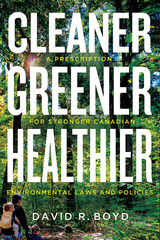
Nature-First Cities
Restoring Relationships with Ecosystems and with Each Other
Nature belongs in cities, but how do we put nature first without pushing people aside? Nature-First Cities reveals the false dichotomy of that question by recognizing that people and nature are not separate.
Western urbanization has meant the tragic, ongoing expulsion of nature, which is engendering biodiversity loss and inequality, thwarting economic potential, and severely affecting health. As a result, productivity drags, and the distress signals of a planet in crisis are ignored. Nature-First Cities charts a different direction, applying the science and practice of nature-directed stewardship to cities. Informed by decades of experience, tested through case studies, and linking bottom-up initiatives with government responsibility, this methodology for urban ecosystem restoration is uniquely effective at revitalizing our strained cities. Nature is woven into networks, distributed equitably across all neighbourhoods, and partnered with the urban density that is essential for addressing the climate crisis.
This practical framework for urban planning reinforces our place in nature both physically, by ensuring that cities are replete with biodiversity and intact ecosystems, and conceptually, by rebalancing our relationships with the planet and with one another.
Students and academics; urban planners and designers; urban residents; and activists engaged in urban, climate, biodiversity, revitalization, and equality issues will all be inspired by this thoughtful, engaging work.
Nature-First Cities challenges the dominant perception of cities as being either booming metropolises or impoverished slums that are inhospitable to nature and wildlife…Urban greenspace and green infrastructure complement traditional infrastructure; provide many ecological, economic, and social benefits; and contribute to the health and well-being of urban dwellers. Isn’t it time we protected, restored, and enhanced the nature in our own neighbourhoods?
Environmental equality in an urban context is a great goal for improving quality of life, which in turn helps with talent retention and growth. The best part is that it's almost always cheaper than traditional solutions in the long run. This book is a road map to keep us on that path.
Sometimes a book comes along that makes obvious what we should have seen all along. This is just such a book. Brewer, Hammond, and Markey alert us to the madness of thinking and acting like we are separate from nature and separate from each other. They apply that wisdom to where the majority of people now live, in cities. The result is an action plan that inspires hope for humanity and the planet, supported with exhaustive research and countless good practices.
Cam Brewer, Herb Hammond, and Sean Markey offer an ecosystem-based approach to city planning. They build their approach on the emerging science of urban ecology. Nature-First Cities: Restoring Relationships with Ecosystems and with Each Other is a timely, important work.
Prepare to be entertained, educated, and stirred to advocate for nature-oriented cities. Brewer, Hammond, and Markey, discontent with Band-Aids and wishful thinking in the face of planetary crises, address the core of what threatens our survival. The authors condense key lessons from a vast landscape of research into a compelling decree for cities to transform and thrive.
Modern ‘techno-industrial’ cities have generally metastasized over the living landscape like malignant growths, oblivious to their utter dependence on the integrity of the ecosphere to which they lay waste. With Nature-First Cities, Cam Brewer, Herb Hammond, and Sean Markey apply the concepts of nature-directed stewardship to urban design in the hope our cities can morph from dismally destructive parasites to mutually supportive – and vibrantly livable – symbionts with the ecosystems that sustain them.
Imagine if humans put nature first each time an action is taken. Asking the questions: Is it really necessary to cut down this tree? Drain this swamp? Fence this migration route? Or leave this light on overnight? This timely book provides both information and inspiration to encourage nature prioritization, providing a foundation to put our relationship with nature, and with ourselves, on a better footing.
Cam Brewer is a lawyer and an adjunct professor with the School of Resource and Environmental Management at Simon Fraser University. He was executive director of Smart Growth BC, ran eco-certification programs at the Canada Green Building Council and the Silva Forest Foundation, and founded a co-op that manufactured and distributed sustainable wood products. He has also served as controller for Greenpeace Canada, co-chair of the VanCity Community Foundation, and principal of an urban sustainability consulting firm.
Herb Hammond is a forest ecologist and nature-directed stewardship planner. He is a co-founder of the Silva Forest Foundation, a charitable society dedicated to research and education in ecosystem-based conservation planning. Hammond is the project lead for more than 25 ecosystem-based conservation plans across Canada and elsewhere in the world. He is also the author of the award-winning Seeing the Forest among the Trees: The Case for Wholistic Forest Use and Maintaining Whole Systems on Earth’s Crown: Ecosystem-based Conservation Planning for the Boreal Forest. Hammond was the recipient of the 2003 Gold Award for Sustainable Living at the Canadian Environmental Awards.
Sean Markey is a certified planner and professor with the School of Resource and Environmental Management at Simon Fraser University. His research addresses issues of sustainable planning and infrastructure, nature-based solutions, local and regional economic development, and rural and small-town planning. He has published widely in academic journals and has co-authored/edited several books. He works with municipalities, non-profit organizations, Indigenous communities, and the business community to promote and develop sustainable forms of community and regional development.
Introduction
1 Nature Expelled
2 Trajectories of Green Planning
3 From Green Planning to Ecosystem Approaches
4 The Vision for Nature-First Cities
5 Nature-Directed Stewardship in Cities
6 Nature-Directed Stewardship in East Vancouver
7 A Process for Inviting Nature Home
Notes; Index









